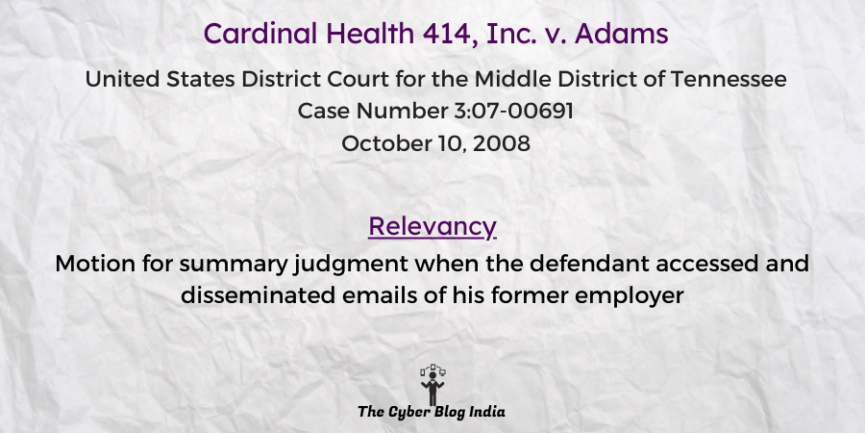Cardinal Health 414, Inc. v. Adams

Cardinal Health 414, Inc. v. Adams
582 F.Supp.2d 967
In the United States District Court for the Middle District of Tennessee
Case Number 3:07-00691
Before District Judge A.A. Trauger
Decided on October 10, 2008
Relevancy of the Case: Motion for summary judgment when the defendant accessed and disseminated emails of his former employer
Statutes and Provisions Involved
- The Stored Communications Act, 18 U.S.C. § 2701
- The Federal Wiretap Act, 18 U.S.C. § 2510
- The Tennessee Wiretap Act, T.C.A. § 39-13-601
- The Tennessee Personal and Commercial Computer Act, T.C.A. § 39-14-601
- The Tennessee Uniform Trade Secrets Act, § 47-25-1701
Relevant Facts of the Case
- The plaintiff’s former nuclear pharmacy division employee, Adams, left the company in February 2005. His departure resulted in the loss of access to his own Cardinal email account. However, he continued to use Young’s username and password to log in and read Young’s emails until August 2006.
- In 2005, Adams disclosed his ongoing capability to access Cardinal’s web server and read Young’s emails during a telephone conversation with Townsend. Adams suggested sharing some of these emails with Townsend, to which Townsend consented.
- Adams sent Townsend certain Cardinal emails, obtained from Young’s account, with disputed frequency and content over a year. Kirkland, a nuclear pharmacy technician, testified that he regularly delivered a “stack” of Adams’ Cardinal emails to Townsend at Music City.
- Adams sent Townsend a “few” emails, which he received and reviewed; however, Townsend is disputing the seriousness and frequency of the email sharing. He asserts that Adams had sent him a total of “ten or so” emails and maintains that he did not request them.
- Cardinal experienced business losses to Music City during email snooping (spring 2005 to summer 2006), with estimated losses of approximately $1.5 million. Townsend/Music City asserts that the losses resulted from competitive pricing and denies any significant impact from the shared emails.
- Cardinal filed a lawsuit ten months later after discovering the email snooping, alleging violations of federal law and Tennessee statutes. Recoveringence proved challenging, as Adams and Townsend no longer possessed the emails, and their computers were either inaccessible or stolen.
Prominent Arguments by the Counsels
- The plaintiff’s counsel argued that the defendants intentionally violated the Stored Communications Act (“SCA”) by accessing, reading, and disseminating their emails without authorisation. This action caused the plaintiff to lose customers and revenue. The counsel argued that the defendants misappropriated the plaintiff’s confidential and proprietary information, such as customer lists, contract expiration dates, and pricing strategies. They used this information to gain an unfair competitive advantage.
- The defendants’ counsel argued that the information at issue, such as customer lists and pricing information, was not trade secret as it was information already known within the industry or readily available. They applied a six-factor test to determine that customer information and pricing lists were not trade secrets. The defendants’ counsel also contended that the plaintiff’s claims were pre-empted by federal law. They made arguments to limit the universe information that could have been reviewed and used and then argued that, as a matter of law, information within that universe was not a trade secret.
Opinion of the Bench
- The plaintiff is entitled to summary judgment on its claim that the defendant violated the SCA and is entitled to at least $1,000 in damages.
Final Decision
- The court granted both the plaintiff’s and the defendants’ motions for summary judgment in part and denied in part:
- Summary judgment for the defendant Townsend/Music City on the plaintiff’s SCA claim;
- Summary judgment for all the defendants on the plaintiff’s Section 2510, civil conspiracy, and state wiretapping law claims; and
- No summary judgment for the defendants on the plaintiff’s claim under state laws for Sections 39-14-601 and 47-25-1701.
Aditi Mangesh Sawant, an undergraduate student at NMIMS Kirit P Mehta School of Law, Mumbai, and Adyasha Sahoo, an undergraduate student at the Institute of Law, Nirma University Ahmedabad, prepared this case summary during their internship with The Cyber Blog India in January/February 2024.
